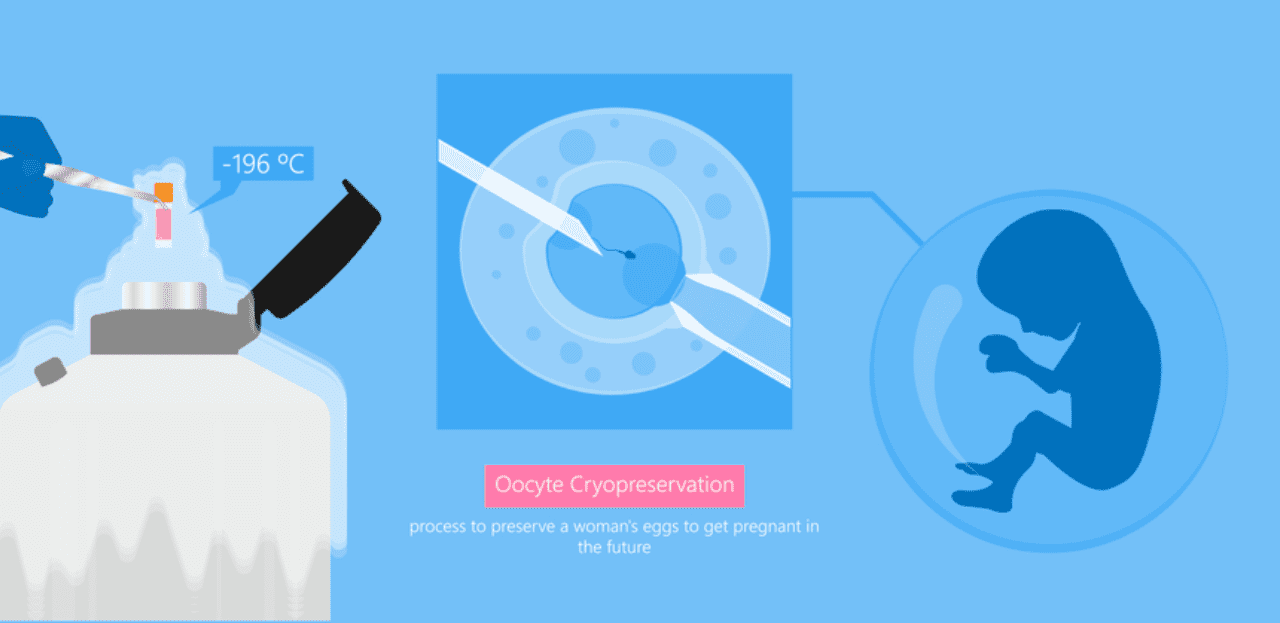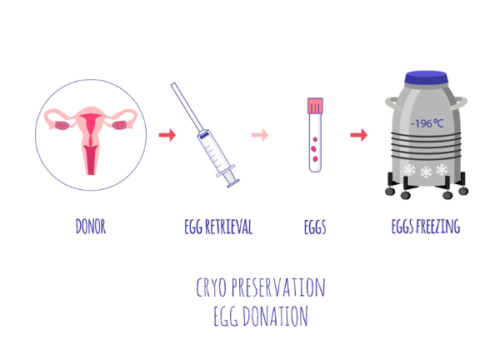Fertility Preservation Services in Chennai
Many couple or women want to preserve their egg or sperm or embryo for a possible future parenthood. Reasons could be many. As they age, the fertility level drops. They could be undergoing treatment such as for cancer or any other medical condition. Simply that they want to time the second child after other commitments are met.
Egg (oocyte) Freezing
Egg freezing extends your biological clock – your timeline for deciding if and when you become a parent – by essentially locking in your fertility potential today. If you are thinking about freezing your eggs, it’s very important to know that the earlier you start the process, the better the result. In your 20’s and early 30’s you’re likely to have the quantity of healthy eggs needed to conceive without medical assistance. Our fertility experts know that conceiving and/or undergoing in vitro fertilization (IVF) treatment later in life can be more challenging, so using your previously frozen eggs when you are older will enhance the likelihood of successful IVF treatment. Women up to age 38 (and sometimes older) can be successful in preserving healthy fertility with egg freezing. The best way to decide if egg freezing is right for you, is to complete an assessment of your fertility health and potential with a Generation Fertility physician.
The PSFC team strives to make the egg freezing process clear and comfortable, empowering you with all the information needed every step of the way.
Read the FAQ on Egg Freezing.. click here

The Egg Freezing Process

The process starts with fertility assessment of the woman
You’ll meet with a caring Generation Fertility doctor to discuss your needs, review your medical history, learn about your options, and what you can expect from the process. We’ll do some blood work and a vaginal ultrasound, to help assess your current fertility potential and develop a personalized egg freezing plan.


Ovarian Stimulation
The next step is to stimulate your ovaries to produce more eggs, using hormone injections to be done at home. You’ll need to visit the clinic every few days during this stage over 10-12 days, so we can monitor how you’re responding to the injections and adjust your doses if needed. After your eggs have matured, the doctor will give you a different injectable medication that will release your eggs, starting ovulation.
Egg Retrieval
The retrieval is a short 20–30-minute procedure at the Generation Fertility clinic. Eggs are retrieved by inserting an ultrasound probe into the vagina to visualize the follicles and passing a thin needle through a channel on the probe to gently suction out the eggs. You’ll be given pain medication, as well as local anesthesia.
You may be a little sore afterward, but most women resume normal activities the next day. Your retrieved eggs will be evaluated and we’ll let you know how many eggs were retrieved, before you leave the clinic.


Freezing & Storage
After the retrieval, your eggs are flash-frozen and stored for future use. Generation Fertility provides long-term egg storage on-site at our facility in Vaughan. The safety of your stored eggs is of the utmost importance to us.
Your eggs can remain frozen indefinitely until you decide you wish to conceive. At that time, they will be thawed and fertilized, with the goal of developing an embryo for transfer into your uterus in a regular IVF procedure.
Talk to Us About Egg Freezing
To help you decide if egg freezing is right for you, we invite you to complete an assessment with us!
Egg Freezing for Medical Reasons
You might also consider preserving your fertility for medical reasons. For instance, surgery, radiation or Talk to Us About Egg Freezing chemotherapy can affect the ovaries, and all these interventions are common reasons why an individual may wish to freeze their eggs. Preserving your fertility for medical reasons is covered in Ontario, learn more today.
Expected Costs
We understand that cost is an important consideration as you determine your course of treatment. Many options are available to help you with this aspect of care.
Sperm Freezing
If the male has to have radiotherapy and/or chemotherapy, this can lead to infertility. In some cases, if the husband cannot be present on the day, his partner’s eggs are collected for various reasons, such as a business trip or psychological reasons. In such cases, sperm can be frozen in advance and stored. Unlike freezing embryos and oocytes, survival rates of sperm after freezing and thawing are high. Pregnancy rates following sperm freezing and thawing are close to those of fresh sperm.

Embryo Freezing
Briefly, embryo freezing is a procedure that adapts to the developmental stage of the embryo. Embryos are placed in prepared media designed to protect embryos from extremely low temperatures. An instrument, controlled by a computer, slowly reduces the temperature of the solution until it reaches –80C Embryos are then labelled and stored individually in tanks filled with Liquid Nitrogen which maintains a temperature of –196C. No biological activity can be observed at these temperatures, and embryos can be stored until the patient is ready for them to be thawed. The freeze-thaw procedure yields a 20% loss of vitality compared with fresh embryos. Technically, frozen embryos can be stored indefinitely depending on the couple’s decision. Although conventionally, embryos are stored for a maximum of 10 years as per ART guidelines. By having couples renew their contract yearly, they can decide whether they want to thaw and transfer the embryos back to the uterus, destroy them or donate the embryos to research. If there are excess good quality embryos after embryo transfer, these can be frozen and stored. Even though not all embryos will survive the freeze-thaw procedure, pregnancy rates have approached fresh embryo transfers.

Embryo freezing has become an established method and has been practised for nearly 20 years, particularly in situations where many oocytes have been retrieved—freezing after embryo formation has provided a second chance for couples whose first attempt did not result in pregnancy. Preparation of the patient for a thawed embryo transfer is medically simpler and less intrusive. In some cases, patients come back to transfer the stored embryos to conceive a second child.
Embryos can be frozen at any point during their development. One can see fertilised eggs on the first day, and then the zygote begins dividing to become an embryo. On the 5th day, the embryo becomes a blastocyst, a stage that shows better results after the freeze/thaw procedure.
The Health Ministry in our country has extended the duration of embryo storage to 10 years. Electronic records where only authorised people with a password can access are made of each patient file.
Embryo Vitrification
This is a method where embryos are frozen quickly to prevent ice crystal formation. When the solution freezes, it solidifies to form a glass-like appearance. This procedure aims to avoid ice crystal formation inside the cell while the temperature is reduced. DMSO (DimethylSulfoxide) and Ethylene Glycol are the most commonly used cryoprotectants. After the embryos are labelled, they are plunged directly into Liquid Nitrogen. Currently, vitrification has become more popularly used in most IVF clinics as the method has shown better survival rates and pregnancy rates than the slow freezing process.
Onco Fertility
A diagnosis of cancer can be overwhelming and sometimes the life- saving treatments prescribed may threaten a patient’s ability to conceive children in the future. There is a small window of opportunity between cancer diagnosis and treatment in which a patient can pursue fertility preservation. Some women diagnosed with cancer face an additional hurdle: the surgery, radiation, and chemotherapy used to treat their illness can also put their fertility at risk. Egg or embryo freezing preserves the option of genetic parenthood for when she’s healthy again.
Oocyte vitrification is a highly effective solution. This technique consists in the ultrafast freezing of oocytes or embryos in liquid nitrogen at -196ºC in order to keep them frozen for the desired period of time, without altering their condition or quality. This way, once the patient has overcome cancer and wishes to become a mother, the oocytes would be devitrified for insemination and the subsequent embryo transfer.
To carry out this technique to preserve fertility, the patient must undergo a hormonal treatment of ovarian stimulation. This favors the ovulation of as many oocytes as possible. At the same time, there are cases in which it is impossible to delay treatment against the disease, so we always recommend evaluating each case with a specialist.
For men diagnosed with cancer and about to go through treatment, sperm freezing is a recommended option.
Pregnancy after cancer:
“Should I have children after having had cancer?” Or “Is a pregnancy safe after cancer?” are some of the most common concerns of women who have managed to overcome this disease and who are considering a pregnancy after chemotherapy or radiotherapy.
Although it is true that the genetic factor can cause the development of cancer, there are only 5% to 10% of cancers registered which are linked to a gene transmitted from parents to children. Thus, the chances of the son and/or daughter having it are very low.
On the other hand, it has not been shown that pregnancy can cause the cancer to reappear, even with the hormonal changes that the woman experiences during this stage. In addition, there is evidence that a woman can go through a pregnancy after chemotherapy or radiotherapy in a perfectly normal way, without any danger to mother or fetus – always provided that the necessary time after having finished the cancer treatment has elapsed. The oncologist will be the person who, after overcoming the disease, will best be able to advise on when to start the process of becoming pregnant.
There are many types of cancer that do not compromise the woman’s fertility, so we can say that pregnancy is possible after cancer. However, it is not possible to assure 100% that cancer and pregnancy are viable in all cases, since it depends on the type of cancer and how each case has been developed individually.
For this reason, we always recommend consulting a specialist (oncologist) and, whenever possible, to take appropriate steps to preserve fertility.

